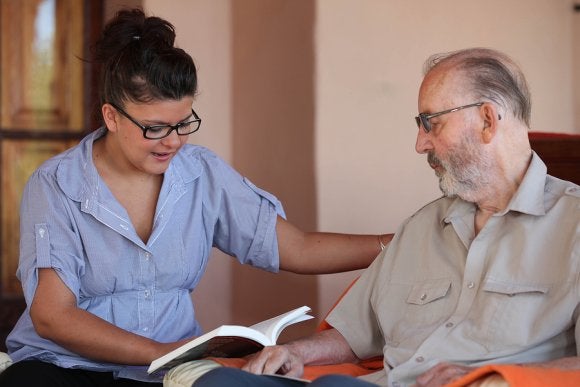-
Tips for Good Nutrition Later in Life
If you’re reaching the age when you’re starting to think about assisted living, it might also be time to revisit your nutritional needs. Caregivers in Memphis note that the amount of specific nutrients a person needs can change throughout life. Your doctor can let you know if your meal plan could benefit from some adjustments. Elder care providers also stress the importance of drinking plenty of water later in life, as a person’s awareness of thirst declines with age.
Watch this featured video to learn about the six categories of essential nutrients you need in your diet. You’ll also learn about adding other nutrients such as resveratrol, carotenoids, phytosterols, and phytoestrogens to support your good health. If you’re having trouble preparing nutritious meals for yourself, an in-home care provider can help.
-
Explaining Alzheimer’s to Children in Memphis, TN
For an elder caregiver , the behavioral and personality changes associated with Alzheimer’s disease are to be expected, but for a child, they can be alarming. When a loved one has been diagnosed with Alzheimer’s disease and is receiving elder care near Memphis, it may be time to consider how to explain these changes to your children in a way that won’t frighten them. Children are remarkably resilient, but they often fear the unknown. Explaining the basics of dementia may be the most effective way to reassure your kids that the changes grandma or grandpa is experiencing are caused by a medical condition.

Find out what your child knows about the disease.
Your child might already have a vague idea of what Alzheimer’s is, depending on his or her age. Consider starting the discussion by asking your child if he or she has heard of Alzheimer’s before, and if so, what your child knows about it. This gives you an opportunity to correct misconceptions and fill in the gaps in your child’s knowledge of the disease.
Explain how Alzheimer’s affects your loved one.
Let your child know that grandma or grandpa has been receiving assisted living services because he or she has Alzheimer’s disease and needs some extra help around the house. Reassure your child that Alzheimer’s disease does not spread from one person to the next, that it progresses very slowly, and that the family still has lots of time to enjoy grandma or grandpa’s company. Point to specific examples of how Alzheimer’s has affected your loved one . You might explain that the disease is why the grandparent keeps forgetting your child’s name, for example, or sometimes talks about things that don’t exist. Reassure your child that it’s the disease that is causing these changes, not something that your child did wrong.
Encourage your child to ask questions and share feelings.
Let your child know that it’s okay to feel sad and that you feel sad, too. Tell him or her that you always welcome your child’s questions and that you’d like it if he or she would share feelings about the situation. Moving forward, encourage your child to continue to enjoy spending time with your aging loved one.
-
A Quick Look at Discharge Planning
After a loved one is discharged from a hospital or long-term care facility, families need to know that there is a risk of re-admittance to the hospital, particularly when the patient is a senior citizen. Careful discharge planning can reduce this risk. Discharge planning involves identifying the patient’s post-discharge needs and connecting the patient to the necessary resources. For example, it’s a good idea for family members to contact a home health agency in Memphis before the patient is discharged. An assisted living provider can ease the transition from the hospital to the home.
When you consult an in-home caregiver, you’ll learn what to expect when your loved one returns home and you’ll discuss ways of overcoming challenges. The assisted living provider may recommend home modifications to improve safety, for instance. A caregiver’s versatility can prove invaluable for your family. He or she can provide assistance with personal care, light housekeeping, meal preparation, and transportation to follow-up medical appointments.

-
The Importance of Hospice Care for Patients and Their Families
When diagnosed with a limited life expectancy, patients, as well as their families, are left with decisions to make about end of life services. If you’re considering hospice care near Memphis , it’s vital to understand how this service can help patients and their families.

For Specialized Care
Hospice care providers are uniquely equipped with the knowledge and skills needed for helping terminally-ill people feel more comfortable and at ease during their final days. The support that these providers can lend can make the end of life process easier on both the patient and his family. When you and your loved one choose to benefit from hospice care, this prevents complications associated with overtreatment at this stage in the patient’s life. Additionally, hospice providers can help patients and their families cope with the final stages of life.
For Personal Assistance
When a patient is considering hospice care, they may be worried about the help they will require in their final days. Opting for specialized end of life care can help patients and families enjoy more time together. Caring for a sick individual can be time-consuming and exhausting, as well as stressful. Hospice care providers can help by providing assistance with light housekeeping, laundry, food preparation, and personal hygiene. These services allow family members to take a break from their caretaker duties and spend more quality time with their loved ones during this emotional period.
For Quality Time
Making patients as comfortable as possible during the final stages of life can help them feel less fearful about the dying process and ease some of their stressful emotions. Hospice care providers are skilled at helping patients who are terminally ill, and can be prepared for situations that family members may not be prepared to handle. Hospice care enables families to enjoy more of their remaining time together by experiencing less stress and worry. When family members feel confident that their loved one received quality care in his last days, the grieving process can be less painful and confusing, making the transition easier for all involved.
-
Household Chore Support from In-Home Caregivers
If you or one of your loved-ones requires a little extra help with daily or weekly domestic tasks, long-term home care in Memphis may be a good solution for you. Here at Caring Companions , our kind and compassionate staff are trained to assist people of all ages to lead comfortable independent lives.
We offer a number of services for those who require assistance with household chores. Our staff can help keep your house clean. We can sweep, vacuum, and mop floors and carpets, dust, and keep kitchens and bathrooms in good condition. If you let us know your trash collection day, we will also take out the garbage. In addition, we can help with your laundry needs. We are happy to wash, dry, and fold clothes. We also provide ironing services on request.
Let us help you keep your home clean and tidy, so that you can live in a pleasant, appealing environment.

-
What to Expect from End of Life Care
What to Expect from End of Life Care
It is incredibly difficult and heart wrenching to learn that your loved one needs end of life care in Memphis . As you and your family begin investigating terminally ill caretaking services, you should consider seeking professional help and support from a counselor, therapist, or spiritual advisor. This person can help you and your loved one make the transition into assisted living and end of life caretaking services.
A home health agency can provide you and your family with an in-home caregiver who has experience in end of life care. This ensures that your loved one can remain in his home, surrounded by friends and family, rather than in hospice care or an assisted living facility.
A home health aide, private duty nurse, or in-home caregiver can provide your loved one with assistance with meal preparation, medication, medical equipment, light household chores, and grooming tasks. A private duty nurse can monitor his vital signs and administer medical care if necessary. Your loved one’s end of life caregiver will work closely with you and a hospice agency or medical provider to provide your loved one with the care and comfort that he needs.

-
Understanding the Services Provided By Hospice Care
If you’re considering hospice care in Memphis for your loved one, it’s important that you have a good idea of which senior care services each hospice can provide. Hospice care often provides in-home attention for elders so that your loved one can remain in the comfort of his own home while receiving health care. Here is a simple guide to understanding the home health care services provided by in-home hospice care.
 Respite Care
Respite Care If you are the primary in-home caregiver for an elderly relative, you may occasionally need a break from providing round the clock elderly care. A home health agency can provide you with respite care services that allow you to take a vacation from elder care while a qualified, experienced home health aide provides your loved one with at home nursing care. You can schedule respite care on a regular weekly or monthly basis, or you can seek respite care services on an on-call basis.
Dementia and Alzheimer’s Care
Dementia and Alzheimer’s disease both cause progressively worsening symptoms, including memory loss and cognitive impairment. If your loved one has been diagnosed with either condition, he may eventually need home health care and senior assisted living services. Your loved one may not be able to bathe, dress, or feed himself, and may have difficulty with mobility and remembering to take medication. If your loved one isn’t quite ready to move into a nursing home but can’t manage to care for himself, you should contact a hospice care service. A private duty nurse or home health aide can provide medication management services, personal care services, meal preparation, transportation, housekeeping services, and memory care.
End of Life Care
One of the most difficult decisions to make is determining whether a loved one needs end of life care. A home health agency can schedule regular visits from a home health aide with experience in end of life caretaking. Your in home caregiver can provide terminally ill hospice care, ensuring that your loved one receives the professional and compassionate care he needs while remaining in his own home.
-
Answering Questions About Hospice
Although many people enter hospice care each year, it continues to remain somewhat of a mystery for the individuals and family members who utilize this service. Hospice care is a wonderful and compassionate option for people who have been diagnosed with a terminal disease or injury. If you and your family have questions and are wondering what hospice care in Memphis is all about, read on to learn some answers to common questions about hospice services.
When It Is Time to Choose Hospice Care?
Anytime a person is in the beginning stages of needing end-of-life care, a discussion about hospice is appropriate. If one is diagnosed with a terminal illness or injury, it is best to discuss the option of hospice when the person who has been diagnosed can make a decision clearly. Legally, the decision for hospice care is to be made by the patient.
If one is diagnosed with a terminal illness or injury, it is best to discuss the option of hospice when the person who has been diagnosed can make a decision clearly. Legally, the decision for hospice care is to be made by the patient.When Does a Patient Begin to Receive Hospice Care?
It can be difficult for some individuals and families to know when the right time for hospice care is. Most hospices will take on a new patient, who is referred by their physician, with a life expectancy of six months or less.Should You Wait for a Physician to Mention Hospice Care?
A physician may not bring up hospice care at a time that feels necessary for you and your family to discuss it. Feel free to bring the idea of hospice up to your physician to get his or her opinion. It is also a good idea to run it by other caregivers, clergy members, as well as family and friends who have received the service before.What if the Patient Starts to Recover After Choosing Hospice?
In the case that a patient starts to show signs of recovery after choosing hospice, they are welcome to return to regular treatment. If a patient goes into remission or begins to heal, the patient is able to go back to a treatment that is recommended to them. Choosing a hospice that feels comfortable for you and your family will ensure that you will be cared for properly while end-of-life care is needed, as well as in the case of recovery. -
A Look at Hospice Care
Hospice programs provide compassionate end-of-life care to individuals who have a life expectancy of six months or less. Individuals receiving this type of home health care in Memphis can receive a variety of palliative services, which are intended to improve comfort and quality of life. Despite the prevalence of hospice programs throughout the country, many people have misconceptions about them.
To learn the truth behind some common misconceptions, watch this interview with a hospice professional. He explains the philosophy of care and where care services are typically provided. He discusses some of the individuals who may benefit from hospice care and the types of professionals who work with hospice patients.
-
What Is End-of-Life Care?
When a loved one is first diagnosed with a serious illness, it’s common for families to meet with specialists, explore treatment options, and consider clinical trials. At a certain point, healthcare providers may inform the patient that the treatments aren’t working and that he or she is not a candidate for other curative options. This doesn’t mean that the patient will no longer receive care; however, services will transition from curative treatments to palliative care. End-of-life care is often provided by Caring Companions in Memphis, who may be working in conjunction with a hospice care program.
Care Team
An end-of-life care team is typically comprised of many different professionals. A patient may have elder care companions who provide services such as light housekeeping, meal preparation, companionship, and personal care. Nurses from the hospice care program can visit the patient’s home to assess his or her needs and determine how to improve quality of life . The hospice team may also include social workers, trained volunteers, spiritual counselors, or members of the clergy.Palliative Care
The hospice care team provides palliative care, which can take many different forms. Palliative care does not focus on treating the condition; rather, it is intended to manage symptoms to provide greater comfort at the end of life. A nurse can help the patient manage his or her pain and other symptoms. He or she may provide prescription medications or medical supplies for symptom management. For example, if a patient can no longer get out of bed to go to the bathroom, the nurse can insert a catheter that will stay in place and drain into a special bag.Family Support
 An important component of end-of-life care is support for the whole family. A hospice care team can offer the family practical assistance and psychological counseling. For instance, a hospice nurse can instruct family members on how to properly set the controls on oxygen therapy equipment, how to lift and transfer the patient, and how to administer medications. A spiritual or psychological counselor can be there to offer emotional support to family members as they struggle to cope with anticipatory grief during their loved one’s illness and the grieving process after the passing.
An important component of end-of-life care is support for the whole family. A hospice care team can offer the family practical assistance and psychological counseling. For instance, a hospice nurse can instruct family members on how to properly set the controls on oxygen therapy equipment, how to lift and transfer the patient, and how to administer medications. A spiritual or psychological counselor can be there to offer emotional support to family members as they struggle to cope with anticipatory grief during their loved one’s illness and the grieving process after the passing.
